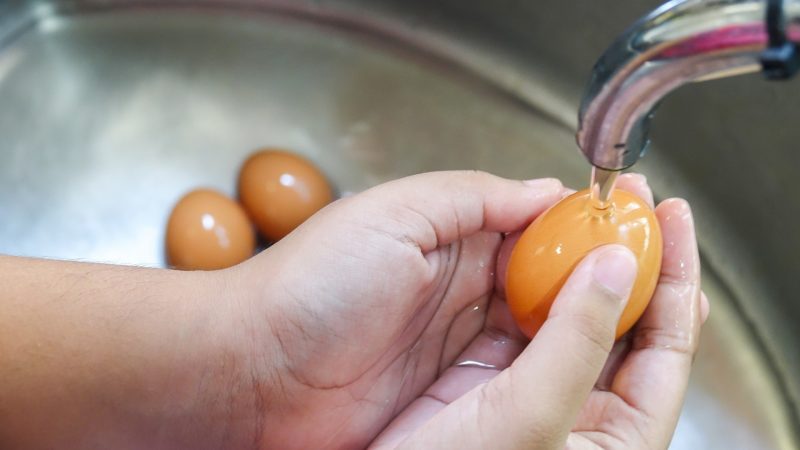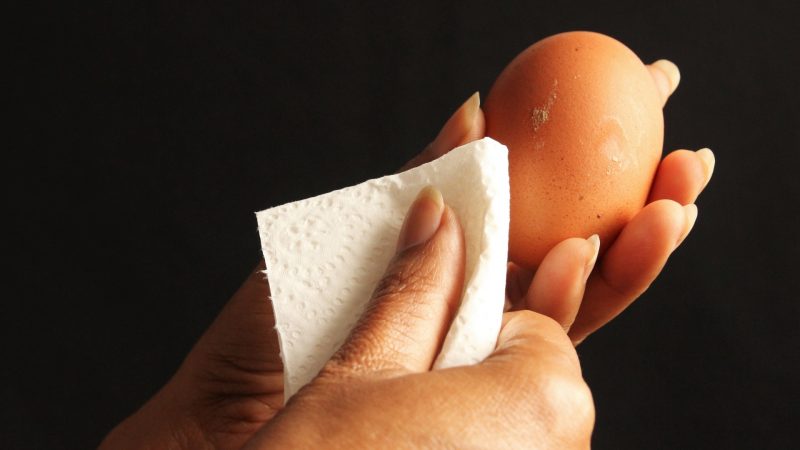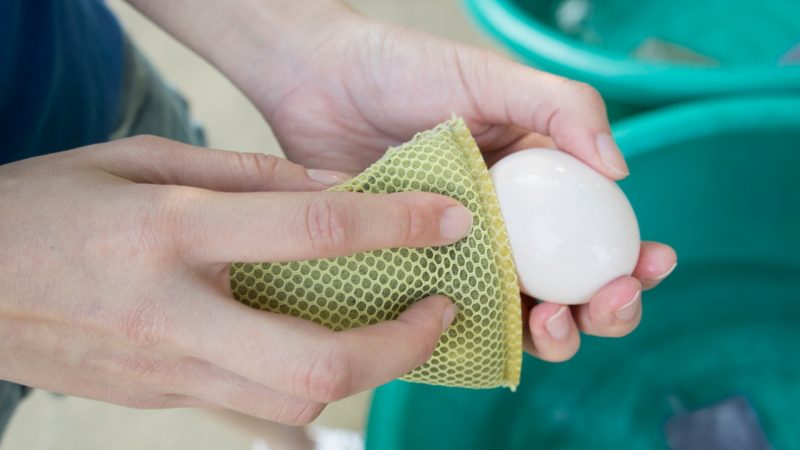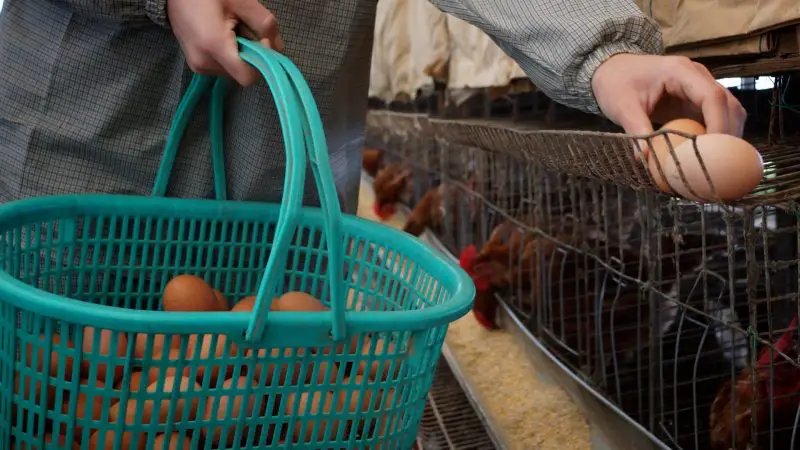Many people can’t seem to agree on whether you should or shouldn’t wash fresh eggs. Some argue that cleaning eggs take away their nutritional value, while others say it removes dangerous bacteria. But is there a way to get the best of both worlds?
How to clean chicken eggs? Scrubbing with a rough sponge will help remove surface dirt. Other methods, such as washing eggs under running water, using commercial egg washes, or wiping with anti-bacterial wet wipes, will remove dirt and harmful bacteria.
The number of eggs, amount of dirt, the effectiveness of the cleaning method, the egg cleaning guidelines for commercial eggs, and the time it takes to clean the eggs will determine the method you should use. Keep reading to learn more.
Wet Cleaning

When wet cleaning eggs, you need to keep in mind the porous nature of eggshells. Microorganisms can easily penetrate the shell and cause food poisoning.
Eggs also expand and contract when exposed to high and low temperatures, respectively. As the eggshell contracts, the bacteria on the surface find their way into the egg. This increases the risk of contamination and food poisoning.
Washing eggs in warm water causes them to expand and prevents bacteria from entering the egg.
When you opt to wet clean your eggs, ensure that:
- The water temperature is slightly higher than that of the egg.
- You clean one egg at a time. Soaking the eggs will cause the pores to expand and lead to contamination.
- After washing the eggs, you should immediately wipe them.
- You clean and disinfect surfaces when you finish, especially when washing the eggs in the kitchen sink.
- Prepare a sanitizing solution, 1 tbsp (0.52 fl oz) bleach per gallon (4.54 L) of water. Dip the eggs in the solution or spray them with the sanitizing agent, rinse, and wipe them dry with a clean towel.
- Refrigerate the eggs immediately.
- You shouldn’t use a disinfectant when washing eggs. However, those who use soap should use fragrance-free varieties because scented soaps interfere with the natural flavor of eggs.
Although egg washing is acceptable in the United States, Japan, and Australia, the European Union forbids it, especially for class A eggs. Once washed, even if the eggs meet the Grade A quality threshold, they are downgraded to Class B.
Interestingly, Sweden has been washing eggs for years. The government requested the EU for exemption from the egg washing rule for eggs produced and consumed within the country.
Dry Cleaning

You can also clean eggs using the dry cleaning method. In this case, the egg is lightly scrubbed using a brush, fine sandpaper, or any other soft abrasive, like the Emery cloth. This cleaning method focuses on the removal of chicken poop and any other dirt from the eggshells.
Unlike wet-cleaned eggs, this method discourages the use of any liquid, including sanitizers. Once the egg is clean, it is immediately stored or packaged for the market.
Does Cleaning Affect the Shelf Life of Eggs?

One of the arguments against egg washing is that it shortens its shelf life.
In the EU, where the eggs are dry cleaned, egg refrigeration is rare. Instead, eggs are displayed on the shelves. However, egg producers are encouraged to sell Grade A eggs within 15 days after they are laid.
In contrast, in the United States, eggs are refrigerated as soon as they are washed. They are even transported in temperature-controlled trucks to the stores, where they are displayed in the refrigerator. Considering the handling of eggs in the US, there is no doubt that washed eggs are more likely to go bad if stored at room temperature.
Lifespan of the Washed Eggs
Eggs have a natural protective cover known as the cuticle. It is a thin coating that keeps bacteria from penetrating the porous eggshell. Unfortunately, when eggs are washed, this coating is also washed off, leaving the egg exposed to bacteria which will cause it to go bad quickly.
Refrigeration extends the life of washed eggs by approximately one month. Eggs that still have the cuticle can be stored at room temperature for at least two weeks. Beyond this period, the egg white becomes thinner. Egg yolks become firmer and degrade when the egg is stored at room temperature for a long time.
So, whether the egg is wet or dry cleaned, it will certainly last longer when refrigerated.
What You Can Do to Collect Clean Eggs?

If you are collecting eggs for your personal use, and want to avoid washing them, the best thing to do is to collect clean eggs. Some of your eggs will have streaks of dirt and chicken poop.
However, you can take these tips to increase the possibility of getting clean eggs.
- Clean the chicken coop as often as possible.
- Disinfect the chicken house at least twice a year to kill germs and bacteria.
- If you are keeping the chicken free-range, prepare an enclosed area where they can rest and lay the eggs.
- Create sufficient nesting space for all your chicken. When you have many chickens in one litter, the probability of getting dirty eggs is higher.
- Use sawdust in the nesting area. Occasionally, stir the poultry litter to keep the area loose and clean. The loose sawdust will also help to clean the chicken’s feet.
- Build a perch over the dropping box, away from the nesting area. The chicken can rest here, and their droppings will collect in the box.
- Remove the chicken droppings regularly to improve the hygiene of the coop.
Related: How to Clean a Chicken Coop? | A Complete Guide
How to Take Care of a Chicken Egg?
Eggs are delicate, so you need to handle them carefully. Not only do they break easily, but there are strict guidelines on the handling of eggs. The way you handle your chicken eggs will affect their quality, and ultimately, the selling price if you produce eggs for sale.
When handling eggs, keep the following points in mind:
- Wash your hands before handling eggs or poultry. Doing this will prevent cross-contamination of germs and bacteria from outside into the chicken coop.
- Have an egg collecting checklist. This will helps you to keep track of your chicken and the eggs they lay.
- Pick the eggs regularly. If you have many chickens, check for eggs multiple times a day. When eggs remain in the nest for longer than necessary, they are likely to get dirty, break, or diminish quality.
- Separate clean eggs from the dirty ones. You will have an easier time cleaning them this way.
- Take note of the dates when you collected the eggs. The quality of eggs tends to diminish as they get older, so the earlier the egg is consumed, the better. Eggs that have not been in storage for long also fetch a better price because of their superior quality.
- Check for defects before storage and packaging. Eggs occasionally show signs of abnormality. They include thin shells and hair cracks. You can easily identify defects when you raise the egg towards a source of light.
- Weigh the eggs. Weight is one of the factors that influence the way the eggs will be graded. A heavier egg tends to have more egg white and a thicker consistency. The decrease in the weight of the eggs is usually a sign that something is wrong with your chicken. You will need to check their health to find out why the eggs are becoming smaller.
- Don’t refrigerate the eggs before cleaning. The eggs will contract, and microbes will move from the outer shell into the egg. Moving the egg from a cold environment to a warm one will also cause it to sweat.
- Place the larger end up when storing the egg. The egg will lose less moisture this way, and it will also remain fresher for longer. Remember to pack eggs laid on the same day together to avoid compromising the quality of the tray.
Related: How to Sell Chicken Eggs? | Helpful Tips
List of Sources
Egg Cleaning Procedures for the Backyard Flock
Cleaning and Disinfection on the Farm
